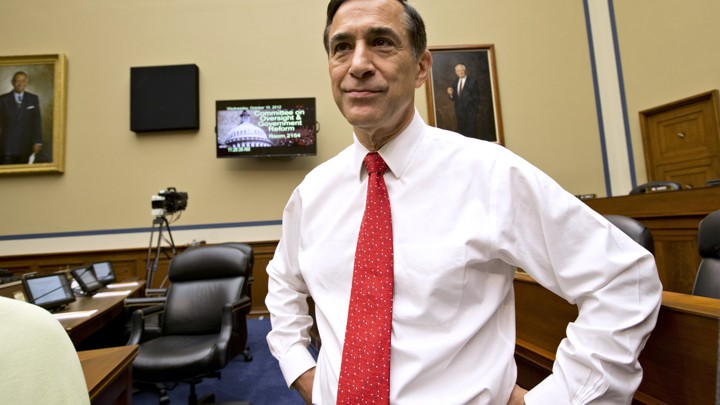
On September 9, 2014, Noah J. Gordon writes on The Atlantic:
Members of Congress are way wealthier than average Americans.
For the second year in a row, Representative Darrell Issa tops the lot with a net worth of $357.25 million, largely the result of his spectacular success at manufacturing car alarms. Issa’s wealth is triple that of second-placed Michael McCaul ($117.54 million). House Minority Leader Nancy Pelosi placed third ($74.11 million), while Senate Minority Leader Mitch McConnell, with net assets totaling $11.97 million, slots in at number 32.
In 2012, the Center for Responsive Politics found that the median congressman was worth more than one million dollars. In an era when it costs an average of more than $10 million to win a seat, it’s no surprise that the wealthy and well-connected would be overrepresented. Nor is congressional wealth a new phenomenon.
But the number of multimillionaires in the Capitol, along with the well-documented rise of income inequality in recent decades, contribute to the perception that politicians are out of touch with average Americans’ needs. The GOP candidate for Senator in Georgia, former Dollar General CEO David Perdue, was accused by a primary opponent’s campaign manager of failing to understand “this is an election, not an auction.” In Kentucky, Senate candidate Alison Lundergan Grimes has criticized Mitch McConnell for quadrupling “his net worth on the backs of Kentuckians that can’t afford it.”
Darrell Issa made his money through managing his company, but he has since moved most of his wealth into the bond market. Others, like Senator Jay Rockefeller and Representative Joseph Kennedy III, are heirs to significant family fortunes. California Representative Gary Miller’s real-estate portfolio accounts for 94 percent of his wealth. McCaul’s wealth is entirely connected to his wife’s family fortune—he does not have a single asset listed in his name in his financial disclosure. Senators John McCain and Claire McCaskill also draw more than 94 percent of their wealth from spouse-owned assets.
Congressional wealth comes from many different places, but one thing links it together: These lawmakers, unlike most of their constituents, do not draw the bulk of their income from a paycheck. In 2010, more than 150 lawmakers reported earning more from outside investments than from the congressional salary, which for a rank-and-file House or Senate member is $174,000. (In 2012, the median U.S. household income was $51,017, and the median household net worth was $56,335.) That discrepancy between the public and lawmakers may distort the congressional debate on topics like the capital-gains tax and the mortgage-interest deduction, which affect members more than they do most of their constituents.
It’s a bipartisan, mostly male, and heavily white bunch.
Some members of Congress have attempted to address the gender pay gap, or the fact that, according to Pew Research Center, women earn 84 percent as much as their male counterparts. In Congress’s rich club, men and women are represented proportionately, as women make up nine of the top 50—similar to the 18.8 percent of Congress they comprise, a record high.
Of the top 50, 20 are Democrats and 30 are Republicans, although Democrats occupy spots 3 through 11. (Sometimes portrayed as the party of the rich, Republicans actually represent districts with less income inequality than do Democrats, largely because Democrats do better in urban areas.)
If the party breakdown is relatively even, the race breakdown is anything but. This Congress, the most diverse in history, is 82 percent white. All of the 50 wealthiest lawmakers are white. Unfortunately, even in a club of top earners like this, one might expect elected black men and women to lag behind whites: For every dollar owned by a white household in the U.S., black households own around a nickel.
Americans may not have much faith in their representatives, but you can say this for them: The people Americans elect are pretty good at choosing what to do with their own money. Investments range from the mundane (Johnny Isakson, Bank of America) to the trendy (Jared Polis, Uber) to the wacky (Alan Grayson, memorabilia authentication). Who will top next year’s list? It’s too soon to tell, but Darrell Issa has a commanding lead. And as any member can tell you, incumbency is a powerful advantage.
Gary Reber Comments:
Getting rich as the people’s representatives is even more true today.
They are getting rich through ownership of the productive capital assets of corporations, while never advocating for enriching the people through ownership.
We need progressive to enact the proposed Capital Homestead Act (aka Economic Democracy Act and Economic Empowerment Act) at http://www.cesj.org/learn/capital-homesteading/, http://www.cesj.org/learn/capital-homesteading/capital-homestead-act-a-plan-for-getting-ownership-income-and-power-to-every-citizen/, http://www.cesj.org/learn/capital-homesteading/capital-homestead-act-summary/ and http://www.cesj.org/learn/capital-homesteading/ch-vehicles/. And The Capital Homestead Act brochure, pdf print version at http://www.cesj.org/wp-content/uploads/2014/11/C-CHAflyer_1018101.pdf and Capital Homestead Accounts (CHAs) at http://www.cesj.org/learn/capital-homesteading/ch-vehicles/capital-homestead-accounts-chas/

